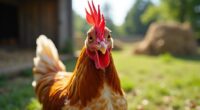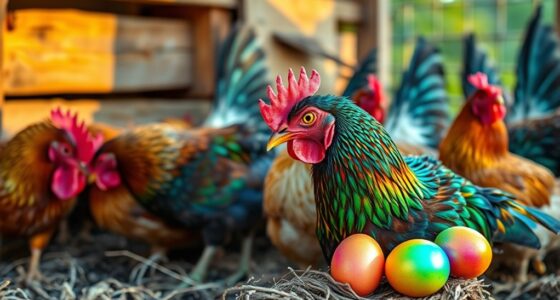If you’re exploring popular chicken breeds, you’ll find options like Leghorns for high egg production and Rhode Island Reds for their hardiness and consistent laying. Heritage breeds such as Sussex and Plymouth Rock offer traditional qualities and better climate adaptation. Some breeds, like Silkies and Polish, stand out with unique appearances and friendly temperaments. Understanding each breed’s traits helps you pick the best birds for your goals and environment—keep exploring to discover more detail.
Key Takeaways
- Leghorns excel in high egg production, making them ideal for steady egg supply.
- Rhode Island Reds are hardy, reliable layers suited for various climates and conditions.
- Silkies are unique for their fluffy plumage and friendly temperament, perfect for small or family farms.
- Sussex and Plymouth Rock are heritage breeds valued for their resilience and traditional qualities.
- Breed selection should consider climate, egg-laying capacity, appearance, and temperament for optimal results.

If you’re considering raising chickens, choosing the right breed can make all the difference. With so many options available, understanding each breed’s unique traits helps you pick the best fit for your goals. One critical factor to consider is egg production challenges. Some breeds are prolific layers, producing eggs almost daily, while others lay less frequently. For example, Leghorns are known for their high egg output, making them ideal if you want a steady supply. On the other hand, breeds like the Rhode Island Red are hardy and consistent layers, even in less-than-ideal conditions. However, not all breeds excel in egg production; some might lay fewer eggs but make up for it with unique qualities like temperament or appearance.
Choosing the right chicken breed impacts egg production, temperament, and resilience—consider your goals for a successful flock.
Another key aspect to think about is heritage breed preservation. Many traditional breeds are considered heritage because they’ve been around for generations and retain traits that modern hybrids may lack. These breeds often have better adaptability to local environments, making them resilient in various climates and conditions. If you’re passionate about conserving genetic diversity, breeds like the Sussex or Plymouth Rock are excellent choices. They’ve stood the test of time and maintain characteristics that can improve the overall health and robustness of your flock. Preserving heritage breeds isn’t just about conservation; it’s about supporting sustainable farming practices and maintaining a connection to traditional poultry-raising methods.
When it comes to traits beyond egg production and heritage status, you’ll notice that some breeds are particularly friendly and easy to handle, which is perfect if you have children or want a more interactive experience. Others may be more independent or flighty, requiring a little more patience. There are also breeds with unique appearances—like the Silkie, with its fluffy plumage, or the Polish with its distinctive crest—that add visual interest to your flock. Considering your climate is essential, too, as some breeds are more cold-hardy, while others thrive in warmer environments.
Ultimately, your choice should align with your priorities—whether that’s maximizing egg production, preserving heritage traits, or simply enjoying the variety of breeds available. Each breed offers a distinct set of benefits and challenges, so take the time to research and reflect on what fits your lifestyle best. By making an informed decision, you’ll set yourself up for a rewarding experience raising chickens, with healthy, productive, and unique birds that bring joy to your farm or backyard.
Frequently Asked Questions
Which Chicken Breeds Are Best for Egg Production?
You want the best breeds for egg production, so focus on those with high egg laying frequency. These chickens lay eggs regularly, ensuring a steady supply. Many of these breeds also produce colorful egg shells, adding variety to your collection. By choosing breeds known for their productivity, you can enjoy frequent eggs and vibrant shells, making your flock both efficient and visually appealing.
Are Certain Breeds More Suitable for Cold Climates?
Did you know that some cold hardy breeds can withstand temperatures as low as -20°F? If you’re in a chilly climate, you’ll want winter resilient chickens, also known as cold hardy breeds. These breeds have thick feathers, compact bodies, and are naturally adapted to cold weather. Choosing these breeds guarantees your flock remains healthy and productive during winter, making them perfect for cold climates.
How Do Chicken Breeds Differ in Temperament?
You’ll notice that chicken breeds differ in temperament, showing various personality traits. Some breeds are friendly and social, making them great for family farms, while others tend to be more independent or reserved. These temperament differences influence how chickens interact with you and each other. Understanding these personality traits helps you choose breeds that match your environment and management style, ensuring a harmonious and enjoyable flock experience.
What Breeds Are Ideal for Small Backyard Flocks?
For small backyard or urban chicken keeping, you want breeds that are friendly, adaptable, and easy to manage. Consider Rhode Island Reds, Orpingtons, or Sussex—they’re known for their calm nature and good egg production. These breeds thrive in limited space, making them perfect for your small flock. They’re also resilient and low-maintenance, helping you enjoy fresh eggs without the fuss of larger or more aggressive breeds.
Which Chickens Are Known for Their Meat Quality?
While many focus on egg production, your interest in meat quality matters too. You’ll find that breeds like Cornish Cross offer exceptional meat flavor profiles, with a fast growth rate compared to heritage breeds. On the other hand, breeds like Jersey Giants grow slower but develop richer, more complex flavors. Balancing growth rate comparisons with meat quality helps you choose the best chicken for flavorful, high-quality meat in your flock.
Conclusion
You might think all chickens are the same, but their unique traits prove otherwise. Each breed has qualities that make it special, from egg-laying prowess to friendly personalities. Some say certain breeds even possess instinctual behaviors that hint at ancient survival skills. So, next time you choose a chicken, remember you’re selecting more than just a bird—you’re embracing a piece of history and nature’s clever design. Who knows? Your perfect breed might hold secrets yet to be discovered.









